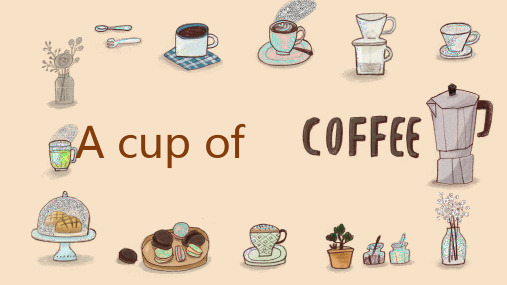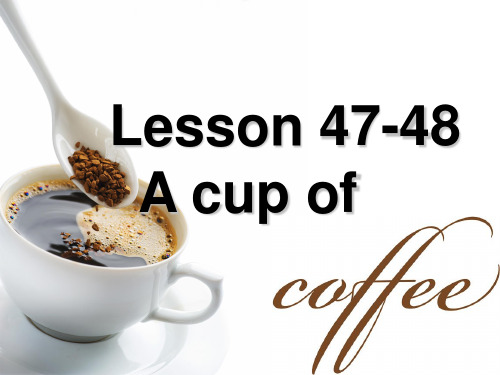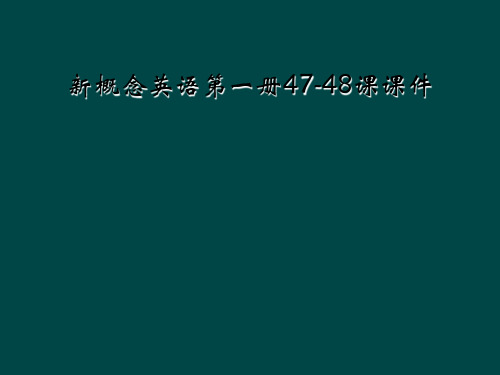新概念英语第一册lesson48课件
合集下载
新概念英语第一册 Lesson 47-48 课件

Do you like/want sth. ?
Do you want eggs? Do you want bananas? Do you want butter? Do you want honey?
4-1 sentence
Do you like eggs?
4-1 sentence
Do you like bananas?
4-1 sentence
Do you like butter?
4-1 sentence
Do you like honey?
4-1 sentence
________ whisky? Can you like Do you like I like
4-1 sentence
Do you want oranges?
a cup= a cup of coffee
2-1 reading
CHRISTINE: Do you want any sug?ar ANN: Yes, please.
2-1 reading
CHRISTINE: Do you want any ?milk ANN: No, thank you. I likdeon't in mymilk coffee.
? ( jam) ? (orange) ? (wine) ? (biscuit)
Content
vocabulary reading
grammar
sentence
4-1 sentence
如何表达喜欢/想要某物?
4-1 sentence
Do you like eggs? Do you like bananas? Do you like butter? Do you like honey?
新概念英语第一册lesson48课(共25张PPT)

• Do you like butter? • Yes, I do . I like butter, but I don’t want any .
Ordinal numbers序数词
one first 1st two second 2nd three third 3rd four fourth 4th
five fifth
5th
six sixth 6th
seven seventh 7th
eight eighth 8th
nine ninth 9th
Lesson 48 Do you like…? Do you want…?
fresh
fresh air 新鲜空气 fresh fruit 新鲜水果 fresh news 最新的消息
adj.新鲜的
egg
n.鸡蛋
我想要一些鸡蛋。 I want some eggs.
一般疑问句
---Do you want any eggs?
• 她儿子是她的掌上明珠。
• Her son is the apple of her eye.
wine beer
n.酒(不可数) n.啤酒(不可数)
• 我想要一些酒。 • I want some wine. • 他正在和他的朋友们喝啤酒。
• He is drinking beer with his friends.
eighth ninth thirtieth fortieth
8th 9th 30th 40th
ve f来代替
fi几十几,只将个位基变序
twenty-first
21st
英语中序数词必须与定冠词(the)连用。 如:the 1st month,the twelfth century(12世纪)
Ordinal numbers序数词
one first 1st two second 2nd three third 3rd four fourth 4th
five fifth
5th
six sixth 6th
seven seventh 7th
eight eighth 8th
nine ninth 9th
Lesson 48 Do you like…? Do you want…?
fresh
fresh air 新鲜空气 fresh fruit 新鲜水果 fresh news 最新的消息
adj.新鲜的
egg
n.鸡蛋
我想要一些鸡蛋。 I want some eggs.
一般疑问句
---Do you want any eggs?
• 她儿子是她的掌上明珠。
• Her son is the apple of her eye.
wine beer
n.酒(不可数) n.啤酒(不可数)
• 我想要一些酒。 • I want some wine. • 他正在和他的朋友们喝啤酒。
• He is drinking beer with his friends.
eighth ninth thirtieth fortieth
8th 9th 30th 40th
ve f来代替
fi几十几,只将个位基变序
twenty-first
21st
英语中序数词必须与定冠词(the)连用。 如:the 1st month,the twelfth century(12世纪)
新概念英语第一册Lesson47-48教学课件

like v. 喜欢,想要 want v. 想 fresh adj. 新鲜的 egg n. 鸡蛋
butter n. 黄油 pure adj. 纯净的 honey n. 蜂蜜 ripe adj. 成熟的 banana n. 香蕉
jam n. 果酱 sweet adj. 甜的 orange n. 橙 Scotch whisky 苏格兰威士忌 choice adj. 上等的,精选的 apple n. 苹果 wine n. 果酒 beer n. 啤酒 blackboard n. 黑板
What kind of coffee does Ann like? She likes black coffee.
What are they? They are biscuits. Does Ann want biscuits? Yes, she does.
Does Ann want one? Yes, she does.
Does Ann want a cup? Yes, she does.
What is it? It's sugar.
Does Ann want any sugar?
Yes, she does.
What is it? It's milk.
Does Ann want any milk?
No, she doesn't.
注意:与the连用
序数词
seventh(7th) 第七 eighth(8th) 第八 ninth(9th) 第九 tenth(10th) 第十 eleventh(11th)第十一 twelfth(12th)第十二
Conclusion
1、Words 2、一般现在时 3、序数词
新概念第一册47-48课件

练习答案 Key to written exercises
A
1 The aeroplane is flying over the village. 2 The ship is going under the bridge. 3 The children are swimming across the river. 4 Two cats are running along the wall. 5 The boy is jumping off the branch. 6 The girl is sitting between her mother and her father. 7 The teacher is standing in front of the blackboard. 8 The blackboard is behind the teacher.
letter for him.
CHRISTINE: Do you like coffee, Ann?
ANN:
Yes, I do.
CHRISTINE: Do you want a cup?=a cup of coffee
ANN:
Yes, please, Christine.
CHRISTINE: Do you want any sugar?
ANN:
No, thank you.
I don't like milk in my coffee.
I like black coffee.
CHRISTINE: Do you like biscuits?
ANN:
Yes. I do.
CHRISTINE: Do you want one?
新概念一册L47-L48课课件

New words
New words & expressions
★like v. ①喜欢; ②想要
Eg:Miss Wang is a good teacher, we like her. Do you like coffee?Yes, I do.你喜欢咖啡么?是的,我喜欢。 Would you like some coffee?你想要点咖啡吗?
one first
1st
two second 2nd
three third
3rd
four fourth
Байду номын сангаас
4th
five fifth
5th
six
sixth
6th
seven eight nine ten eleven twelve
seventh 7th eighth 8th ninth 9th tenth 10th eleventh 11th twelfth 12th
Do you like butter? Yes, I do. I like butter, but I don’t want any.
Numbers
英语中序数词必须与定冠词(the)连用, 如:the first month,the twelfth floor(12楼)
基数词 序数词 缩写 基数词 序数词 缩写
★Scotch whisky 苏格兰威士忌
Scotch adj. 苏格兰人的;苏格兰语的 Scotland苏格兰
★choice adj.上等的,精选的 n.选择
choice apples上等苹果 make a choice做选择 This is not my choice.
★apple n.苹果(可数名词)
新概念英语第一册45-48课课件(动词的分类:实义,系动词,助动词,情态动词)

用括号里动词的正确形式填空
1. There (be) some water in that bottle.
2. (do) she like apple juice?
3. Tom (sit) near the tree now
Ⅳ. grammars
1. 动词的分类
(2)连系动词: 即系动词,表示主语“是什么”或“怎么样”的词。最主要 的连系动词“be”动词。 它虽然有词义,但不完整,不能单独作谓 语,必须跟名词和形容词等(表语)一起构成谓语。
She is a teacher. We are Chinese.
Ⅳ. grammars
Ⅰ. words and expressions
• Terrible • (1) 可怕的,骇人的 • It is a picture of terrible new weapons. • (2) 困难的,费劲儿的 • Who can accomplish this terrible task? • (3) 极度的,非常严重的 • I’ve got a terrible stomachache. • (4) 蹩脚的,糟透的 • She is terrible at maths and English. •
Ⅰ. words and expressions
• Put on • (1) 穿上,戴上 • She takes off the old dress and puts on a new one. • (2) 上演,演出 • A new play will be put on. • Put on 表示“穿”的动作 • Wear 表示“穿着”的状态 • She wears a red dress in the party. • Put on 与代词连用,应将代词放在put和on的中间。与名词连用时,
1. There (be) some water in that bottle.
2. (do) she like apple juice?
3. Tom (sit) near the tree now
Ⅳ. grammars
1. 动词的分类
(2)连系动词: 即系动词,表示主语“是什么”或“怎么样”的词。最主要 的连系动词“be”动词。 它虽然有词义,但不完整,不能单独作谓 语,必须跟名词和形容词等(表语)一起构成谓语。
She is a teacher. We are Chinese.
Ⅳ. grammars
Ⅰ. words and expressions
• Terrible • (1) 可怕的,骇人的 • It is a picture of terrible new weapons. • (2) 困难的,费劲儿的 • Who can accomplish this terrible task? • (3) 极度的,非常严重的 • I’ve got a terrible stomachache. • (4) 蹩脚的,糟透的 • She is terrible at maths and English. •
Ⅰ. words and expressions
• Put on • (1) 穿上,戴上 • She takes off the old dress and puts on a new one. • (2) 上演,演出 • A new play will be put on. • Put on 表示“穿”的动作 • Wear 表示“穿着”的状态 • She wears a red dress in the party. • Put on 与代词连用,应将代词放在put和on的中间。与名词连用时,
新概念英语第一册47-48课课件

新概念英语第一册47-48课课件
Let’s review!
can的句型结构 肯定句
主语+can+动词原形~.
否定句
主语+can+not+动词原形~. 一般疑问句
Can+主语+动词原形~?
我会说英语。 I can speak English. 我会煮晚饭。 I can cook dinner.
1. 我不会踢足球。 2. 我不会做书架。
3. 她不会做作业。 4. 我们不会沏茶。 1. I can’t play football.
2. I can’t make bookcase. 3. She can’t do the homework. 4. We can’t make the tea.
Would you like some water? 你想要一些水吗?
Would you like to play football with us? 你愿意和我们一起去踢足球吗?
How do you like...? 意为"你认为……怎么样?“ =What do you think of...? -How do you like the film? 你认为这部电影怎么样?
do功能1: (1) 构成一般疑问句。 思考:以下句子可以这样变成一般疑
问句吗?
They love her. Love they her?× He loves you. Loves he you? ×
do功能1:
(1) 构成一般疑问句。
以下句子应如何变成一般疑问句吗?
They love her.
都有Do Do you like coffee, Ann? Do you want a cup? Do you want any sugar? Do you want any milk? Do you like biscuits? Do you want one?
Let’s review!
can的句型结构 肯定句
主语+can+动词原形~.
否定句
主语+can+not+动词原形~. 一般疑问句
Can+主语+动词原形~?
我会说英语。 I can speak English. 我会煮晚饭。 I can cook dinner.
1. 我不会踢足球。 2. 我不会做书架。
3. 她不会做作业。 4. 我们不会沏茶。 1. I can’t play football.
2. I can’t make bookcase. 3. She can’t do the homework. 4. We can’t make the tea.
Would you like some water? 你想要一些水吗?
Would you like to play football with us? 你愿意和我们一起去踢足球吗?
How do you like...? 意为"你认为……怎么样?“ =What do you think of...? -How do you like the film? 你认为这部电影怎么样?
do功能1: (1) 构成一般疑问句。 思考:以下句子可以这样变成一般疑
问句吗?
They love her. Love they her?× He loves you. Loves he you? ×
do功能1:
(1) 构成一般疑问句。
以下句子应如何变成一般疑问句吗?
They love her.
都有Do Do you like coffee, Ann? Do you want a cup? Do you want any sugar? Do you want any milk? Do you like biscuits? Do you want one?
新概念英语第一册47-48课(完整版)PPT课件

2021
33
• He works hard. • 他工作很努力。 • Does he work hard? • 他工作很努力吗?
2021
34
•The girls smile. ([smail] 动词:微笑) 女孩们微笑。 •Do the girls smile? 女孩们在微笑吗?
2021
35
• ★对do引导的疑问句的回答: • Do you like coffee, Ann? • 肯定: • Yes, I do. • 注意不用“Yes, I like.”来回答。 • 否定: • No, I don’t.
配成,不过它还会加入少量巧克力。巧克力通常会以巧克力糖浆的形式添加,但
某些咖啡售卖系统便会以即溶巧克力粉取代。有时,打起了的奶油、可可粉,
和棉花糖都会加在上面用来加重咖啡20的21香味和作为装饰之用。
5
Cappuccino 卡布奇诺
[kæpə’tʃi:nəʊ]
卡布奇诺(又有译名“加倍情浓”)意思是意大利泡沫咖啡。 20世纪初期,意大利人发展出了卡布奇诺咖啡。在浓缩咖啡上,倒入以蒸汽发泡的牛奶。 此时咖啡的颜色,就像圣方济会的修士在深20褐21色的外衣上覆上一条头巾一样, 6 卡布奇诺咖啡因此得名。
• ② v. 需要
• My shoes want cleaning.
•
我的鞋需要擦擦了。 2021
11
Language Points
sth.
sth.
1.like to do sth. 2.want to do sth.
doing sth.
sb. to do sth.
2021
12
“I like coffee. Do you like coffee?”
- 1、下载文档前请自行甄别文档内容的完整性,平台不提供额外的编辑、内容补充、找答案等附加服务。
- 2、"仅部分预览"的文档,不可在线预览部分如存在完整性等问题,可反馈申请退款(可完整预览的文档不适用该条件!)。
- 3、如文档侵犯您的权益,请联系客服反馈,我们会尽快为您处理(人工客服工作时间:9:00-18:30)。
egg
• • • • • • •
n.鸡蛋
我想要一些鸡。 I want some eggs. ---Do you want any eggs? ---Yes, I do. No, I don’t. Put all the eggs in one basket. 冒很大的风险
butter
n.黄油(不可数)
Lesson 48 Do you like…? Do you want…?
New Words and Expressions fresh adj.新鲜的 egg n.鸡蛋 butter n.黄油 pure adj.纯净的 honey n.蜂蜜 ripe adj.成熟的 banana n.香蕉 jam n.果酱
sweet adj.甜的 orange n.橙 Scotch whisky 苏格兰威 士忌 choice adj.上等的 apple n.苹果 wine n.酒 beer n.啤酒 blackboard n.黑板
fresh
• • • • • •
•
adj.新鲜的
fresh air 新鲜空气 fresh fruit 新鲜水果 fresh/latest news 最新的消息 break fresh ground 做以前从未做过的事情 开辟新天地
• 肯定句: • She is a teacher. 这第一种形式就是已经学过的S+be的系表结构,不再举 例。 • I like beef. • He likes the beef. 第三人称单数要进行-s –es的变化。 • 否定句与疑问句: • I don’t like beef. Do you like beef? Yes, I do. No, I don’t. What do you like? • He doesn’t like beef. Does he like beef? Yes, he does. No, he doesn’t. What does he like? • What does he do? 他在干什么? • 1. 由此可见,一般现在时中,否定句与疑问句要用助动词do来提问(第三 人称用does)。 • 2. 注意的是,如果句子中有了助动词does了,那么实义动词本身不变化。 • 3. 注意这个does的发音。 • 动词的变化:当主语是第三人称单数时,动词需要变化,规则与名词的复 数类似: • 1. 一般动词加 –s • 2. 以s/sh/ch/x/z 加-es,如:push、pass、catch、fix、buzz • 3. 以辅音+y结尾,把y变i再加-es,如:study、cry • 4. 以辅音+o结尾加es,如:do、go。
sweet
• The apple is very sweet.
adj.甜的
• 表示不同味道 (tastes) 的词:
• • • • sour bitter salty spicy/hot 酸的 苦的 咸的 辣的
Scotch whisky
• Scotch [skɔtʃ] • adj. 苏格兰人的;苏格兰语的 • Scotland苏格兰
• the apple of sb’s eye • 某人最喜欢的人或物 • …心肝宝贝/掌上明珠
• Her son is the apple of her eye. • An apple a day keeps the doctor away.
wine n.酒(不可数) beer n.啤酒(不可数) blackboard n.黑板
• He does’t want any honey.
• honey 亲爱的(Am) • Honey. come here. • honeymoon蜜月
ripe
• a ripe apple. • 一个熟苹果。
adj.成熟的
• The time is ripe. • 时机成熟了。 • mature
banana
Do exercises on P96.
练习答案 Key to written exercises
•A
• • • • • • • • 1 2 3 4 5 6 7 8 The aeroplane is flying over the village. The ship is going under the bridge. The children are swimming across the river. Two cats are running along the wall. The boy is jumping off the branch. The girl is sitting between her mother and her father. The teacher is standing in front of the blackboard. The blackboard is behind the teacher.
苏格兰威士忌
choice
• choice apples
adj.上等的
• 上等的苹果。 • choice n.选择
– make a choice
• 做决定,做选择
apple
n.苹果
• There are some apples and an orange in the basket. • There is an orange and some apples in the basket.
B
• • • • • • • • • • 1 Yes, I do. I like honey, but I don't want any. 2 Yes, I do. I like bananas, but I don't want one. 3 Yes, I do. I like jam, but I don't want any. 4 Yes, I do. I like oranges, but I don't want one. 5 Yes, I do. I like ice cream, but I don't want any. 6 Yes, I do. I like whisky, but I don't want any. 7 Yes, I do. I like apples, but I don't want one. 8 Yes, I do. I like wine, but I don't want any. 9 Yes, I do. I like biscuits, but I don't want one. 10 Yes, I do. I like beer, but I don't want any.
• Do you want any butter? • Yes, I do. No, I don’t.
pure
adj.纯净的
• drinking water饮用水 • pure water 纯净水 • pure milk 纯牛奶 • mineral water 矿泉水
honey
n.蜂蜜(不可数)
• • • •
4. 描述客观的事实或普遍真理: The sun rises on the east. The earth moves around the sun. 5. 口语的时候也可以代替将来时(come go leave arrive start get stay 等单词): • The meeting starts at 5 o’clock. 会议将在 5点中开始 • 注意和be going to的区别。 • We are going to a meeting at 5 o’clock.
IQ Test
Yesterday the doctor gave me some tablets( 药片). There were five in the box. He told me to take one every half hour. How long did they last?
Assignments: 1. 复习like的用法,用“Do you like…?” “Do you want…?”句型分别造5个句子。 2.听写并背诵第47课课文; 3.完成练习册第47课、第48课; 4. 思考前面一页的IQ题。
• I want some wine. • She is drinking beer with her friend.
Practice
Grammar
一般现在时的基本用法: 1. 描述现在的事实或状态,常用be等表示状态的动词 。 There flowers are very beautiful. I am thirteen. / We are students. 2. 表示经常性的习惯性的动作,常与表频度的 时间状语连用。 (always ,often ,usually ,sometimes): He goes to school at 8 o’clock everyday. He reads English everyday. 3.表示主语具备的性格、能力和特征。 I don’t want so much.
n.香蕉
• the ripe bananas • 熟香蕉 • ---Do you like bananas? • ---Yes, I do. • No, I don’t.
jam
n.果酱
• They don’t like jam.
• Do you want any jam? • Yes, I do. • No, I don’t. • jam n.堵塞 • traffic jam 交通堵塞。
